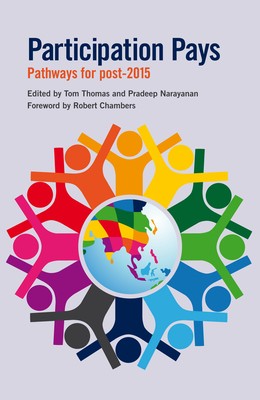
- We will send in 10–14 business days.
- Publisher: Practical Action Publishing
- ISBN-10: 1853398705
- ISBN-13: 9781853398704
- Format: 15.5 x 23.1 x 1.5 cm, minkšti viršeliai
- Language: English
- SAVE -10% with code: EXTRA
Participation Pays (e-book) (used book) | bookbook.eu
Reviews
Description
The processes of international development often mean that beneficiaries have pre-designed programmes imposed upon them. Even the most well-intentioned development projects are often constrained by funding requirements from fulfilling their vision of social justice, with the result that poor, marginalized communities feel even more disempowered and excluded by programmes over which they have no control. Participation Pays attempts to show how beneficiaries of aid can challenge and overcome conventional power arrangements set up by donors and development agencies. It does so through a focus on community knowledge and self-generated data, control of which enables greater ownership and direction of development processes. These projects involved members of marginalized and resource-poor communities including landless people, female sex workers, tribal people, and people affected by a natural disaster. Eight thematic case studies are featured, seven from India and one from the Maldives. Participation Pays argues for the need, in any vibrant democracy, for multiple ways of making development more accountable to excluded communities. In doing so, the book invites an understanding of marginalized people not simply as beneficiaries of technical solutions, but -through the work of participatory development projects - architects of a politics of equity and democratization.
1. Introduction: powering knowledge from the margins
2. Breaking the barriers to information: community-led land mapping in Bihar
3. Building consensus methodically: community rebuilding in the Maldives
4. Knowledge base: towards a community-owned monitoring system
5. Lost policies: locating access to infrastructure and services in rural India
6. A new deluge? People and aid in the aftermath of disaster
7. Subverting for good: sex workers and stigma
8. Making people count: from beneficiaries to evaluators
9. Reimagining development: marginalized people and the post-2015 agenda
10. Conclusion: pathways to post-2015
EXTRA 10 % discount with code: EXTRA
The promotion ends in 22d.14:44:51
The discount code is valid when purchasing from 10 €. Discounts do not stack.
- Publisher: Practical Action Publishing
- ISBN-10: 1853398705
- ISBN-13: 9781853398704
- Format: 15.5 x 23.1 x 1.5 cm, minkšti viršeliai
- Language: English English
The processes of international development often mean that beneficiaries have pre-designed programmes imposed upon them. Even the most well-intentioned development projects are often constrained by funding requirements from fulfilling their vision of social justice, with the result that poor, marginalized communities feel even more disempowered and excluded by programmes over which they have no control. Participation Pays attempts to show how beneficiaries of aid can challenge and overcome conventional power arrangements set up by donors and development agencies. It does so through a focus on community knowledge and self-generated data, control of which enables greater ownership and direction of development processes. These projects involved members of marginalized and resource-poor communities including landless people, female sex workers, tribal people, and people affected by a natural disaster. Eight thematic case studies are featured, seven from India and one from the Maldives. Participation Pays argues for the need, in any vibrant democracy, for multiple ways of making development more accountable to excluded communities. In doing so, the book invites an understanding of marginalized people not simply as beneficiaries of technical solutions, but -through the work of participatory development projects - architects of a politics of equity and democratization.
1. Introduction: powering knowledge from the margins
2. Breaking the barriers to information: community-led land mapping in Bihar
3. Building consensus methodically: community rebuilding in the Maldives
4. Knowledge base: towards a community-owned monitoring system
5. Lost policies: locating access to infrastructure and services in rural India
6. A new deluge? People and aid in the aftermath of disaster
7. Subverting for good: sex workers and stigma
8. Making people count: from beneficiaries to evaluators
9. Reimagining development: marginalized people and the post-2015 agenda
10. Conclusion: pathways to post-2015


Reviews